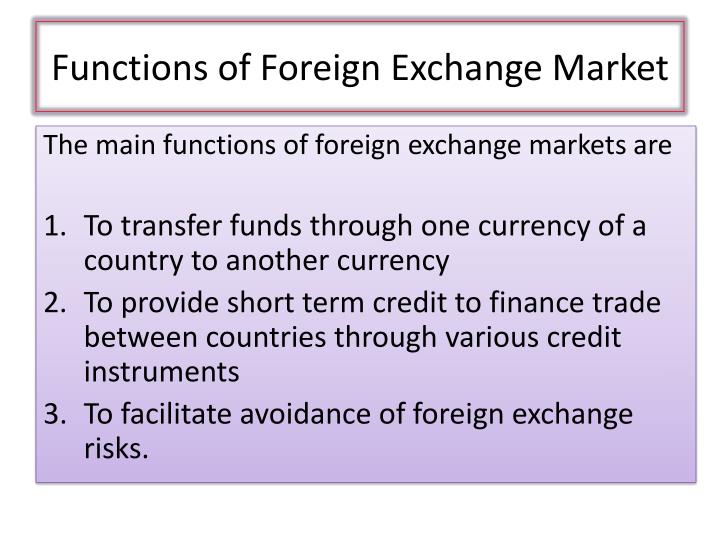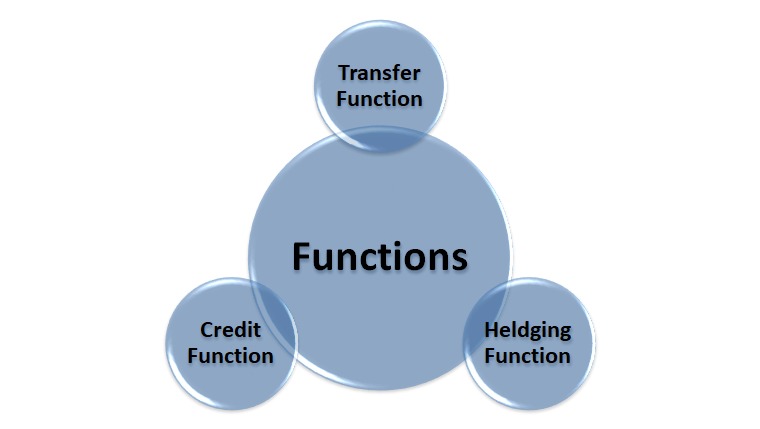Foreign exchange market and it’s functions – The foreign exchange market, a bustling hub of global finance, plays a pivotal role in facilitating international trade, hedging against currency risks, and channeling capital flows. Its participants, ranging from multinational corporations to central banks, navigate a dynamic landscape influenced by economic fundamentals, political events, and market sentiment.
Within this intricate network, spot and forward markets coexist, catering to immediate and future currency exchange needs. Over-the-counter and exchange-traded markets offer diverse trading platforms, while regulatory bodies ensure market stability and integrity.
Foreign Exchange Market Overview
The foreign exchange market, also known as the forex market, is a global decentralized marketplace where currencies are traded. It is the largest financial market in the world, with a daily trading volume exceeding $6.6 trillion.
Participants in the foreign exchange market include banks, investment firms, hedge funds, corporations, and individual traders. Central banks also play a significant role in the market by managing their countries’ foreign exchange reserves and intervening to influence exchange rates.
Role of Central Banks
Central banks play a crucial role in the foreign exchange market by:
- Managing their countries’ foreign exchange reserves: Central banks hold reserves of foreign currencies to facilitate international trade and support their currencies’ value.
- Intervening in the foreign exchange market: Central banks may buy or sell their currencies in the market to influence exchange rates and achieve specific economic goals, such as promoting exports or stabilizing inflation.
- Setting interest rates: Central banks set interest rates, which can affect the value of a country’s currency relative to others.
Functions of the Foreign Exchange Market: Foreign Exchange Market And It’s Functions
The foreign exchange market plays a crucial role in facilitating international trade, hedging against currency risk, and enabling capital flows. These functions ensure the smooth operation of global economic activities.
Facilitating International Trade
International trade involves the exchange of goods and services between countries, which necessitates the conversion of currencies. The foreign exchange market provides the platform for businesses and individuals to exchange currencies at agreed-upon rates, enabling seamless cross-border transactions.
Hedging Against Currency Risk
Currency risk arises when the value of one currency fluctuates against another. The foreign exchange market allows businesses and investors to hedge against this risk by entering into forward contracts or options. These instruments enable them to lock in exchange rates and protect themselves from potential losses due to currency movements.
Capital Flows
The foreign exchange market facilitates capital flows between countries. Investors can purchase foreign securities, such as stocks or bonds, through the market, allowing for diversification of investments and the pursuit of higher returns. Additionally, the market enables governments and corporations to raise capital by issuing bonds or equities in different currencies.
Obtain recommendations related to in the foreign exchange market the quantity u.s. dollars demanded is a function of that can assist you today.
Market Structure and Trading Mechanisms

The foreign exchange market is characterized by a complex and dynamic market structure, involving a diverse range of participants and trading mechanisms. Understanding these elements is crucial for navigating the complexities of the Forex market.
Browse the multiple elements of foreign exchange reserves to gain a more broad understanding.
Market Participants
The foreign exchange market is a global network of financial institutions, corporations, central banks, and individual traders. These participants engage in currency trading for various reasons, including:
- Commercial transactions: Businesses involved in international trade require foreign currencies to settle payments and manage their operations.
- Investment and speculation: Investors seek to profit from currency fluctuations by buying and selling currencies at favorable exchange rates.
- Central bank intervention: Central banks intervene in the Forex market to influence exchange rates and manage their economies.
Spot and Forward Markets, Foreign exchange market and it’s functions
The foreign exchange market operates in two primary markets: the spot market and the forward market.
- Spot market: In the spot market, currencies are traded for immediate delivery, typically within two business days.
- Forward market: In the forward market, currencies are traded for delivery at a specified future date, typically ranging from one month to several years.
Over-the-Counter and Exchange-Traded Markets
The foreign exchange market can be classified into two types based on the trading mechanism:
- Over-the-counter (OTC) market: The OTC market is a decentralized network where currencies are traded directly between two parties, without the involvement of an exchange.
- Exchange-traded market: The exchange-traded market operates through centralized exchanges, where currencies are traded on standardized contracts.
Factors Influencing Exchange Rates
Exchange rates are influenced by a complex interplay of economic, political, and psychological factors. Understanding these factors is crucial for market participants to make informed decisions.
Economic Fundamentals
Economic fundamentals are the underlying economic conditions of a country that affect its currency’s value. Key indicators include:
- Gross domestic product (GDP) growth rate
- Inflation rate
- Interest rates
- Current account balance
- Fiscal deficit
Strong economic fundamentals, such as high GDP growth and low inflation, typically lead to a stronger currency.
Political and Geopolitical Events
Political and geopolitical events can significantly impact exchange rates. For example, political instability, elections, and wars can lead to currency volatility.
Obtain a comprehensive document about the application of foreign exchange market long run that is effective.
Market Sentiment
Market sentiment refers to the overall attitude of market participants towards a particular currency. Positive sentiment, such as optimism about a country’s economic outlook, can lead to increased demand for its currency and a stronger exchange rate.
Risk Management in Foreign Exchange Market

The foreign exchange market is a complex and volatile environment, posing various risks to participants. Effective risk management strategies are crucial for mitigating these risks and preserving capital.
Types of Risks in Foreign Exchange Market
The primary risks in the foreign exchange market include:
– Currency Risk: Fluctuations in exchange rates can result in losses on foreign currency positions.
– Interest Rate Risk: Changes in interest rates can impact the value of currency pairs.
– Country Risk: Political and economic instability in a country can affect the value of its currency.
– Settlement Risk: The possibility of a counterparty defaulting on a foreign exchange transaction.
– Liquidity Risk: The difficulty or inability to execute a foreign exchange transaction at a desired price and quantity.
Hedging Instruments for Risk Management
To manage these risks, market participants employ various hedging instruments, including:
– Forward Contracts: Agreements to buy or sell a currency at a fixed exchange rate on a future date.
– Currency Options: Contracts that give the buyer the right, but not the obligation, to buy or sell a currency at a specified price.
– Currency Swaps: Agreements to exchange one currency for another at an agreed-upon exchange rate, with a reversal at a later date.
Risk Management Strategies
Effective risk management strategies involve:
– Diversification: Spreading investments across different currencies to reduce exposure to any single currency risk.
– Hedging: Using hedging instruments to offset potential losses from adverse exchange rate movements.
– Scenario Analysis: Evaluating potential market scenarios and developing contingency plans to mitigate risks.
– Stress Testing: Simulating extreme market conditions to assess the resilience of risk management strategies.
By implementing sound risk management practices, market participants can navigate the foreign exchange market with greater confidence and protect their capital from potential losses.
Regulations and Market Supervision

The foreign exchange market, due to its vastness and complexity, requires effective regulations and supervision to ensure its integrity, stability, and transparency. Regulatory bodies play a crucial role in monitoring the market, enforcing rules, and safeguarding the interests of participants.
Types of Regulations
Various types of regulations are in place to govern the foreign exchange market, including:
- Capital controls: Measures implemented by governments to restrict the flow of capital into and out of a country.
- Anti-money laundering and counter-terrorism financing regulations: Laws designed to prevent the use of the financial system for illegal activities.
- Market conduct regulations: Rules governing the behavior of market participants, such as brokers and dealers, to ensure fair and ethical practices.
- Prudential regulations: Standards set to ensure the financial soundness and stability of institutions involved in the foreign exchange market.
Impact of Regulations
Regulations significantly impact the foreign exchange market in several ways:
- Enhanced market stability: Regulations help prevent excessive speculation and volatility, contributing to a more stable and orderly market environment.
- Reduced systemic risk: Prudential regulations ensure that institutions have adequate capital and risk management practices in place, reducing the risk of systemic failures.
- Increased transparency: Regulations promote transparency by requiring market participants to disclose information and adhere to reporting standards.
- Protection of investors: Market conduct regulations protect investors from fraud and unfair practices, fostering confidence in the market.
Closing Summary
The foreign exchange market remains an indispensable component of the global economy, connecting nations and facilitating the seamless flow of goods, services, and capital. Understanding its functions and intricacies empowers businesses, investors, and individuals alike to navigate the ever-changing currents of international finance.
